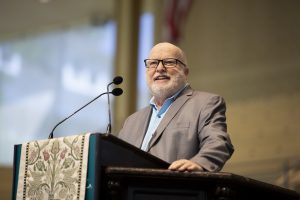
“Colossians 1:15-20 is the premier text for Franciscan Christology, so forgive me if I have too many ideas in my head and mouth,” said Fr. Richard Rohr, OFM, at the 9:15 a.m. Wednesday Ecumenical Service.
His sermon title was “Incorporating the Negative,” and the Scripture reading was Colossians 1:15-20.
In these verses, the word “all” is used eight times.
“It is a universal vision,” Rohr said. “I wanted to name my book ‘Another Name for Every Thing.’ ”
The book was titled The Universal Christ, because the publishers thought the alternative title sounded too pantheistic.
“I wanted to talk about the confluence of matter and spirit, the ordinary and holiness,” Rohr said. “The early church fathers clarified this problem long ago. Pantheism is that God is the same and equal in everything, that we are all God. I don’t know about you, but I don’t want to be God.”
Panentheism, he said, “is pure gospel, it is incarnation, it is God in all things, manifest in all things, but is not the totality of God.”
“It puts us at home in the world,” he said. “God is not somewhere else; this is a major problem for all world religions.”
It is not private malice that is destroying the world, Rohr told the congregation, but “the schizophrenia in our moral theology.”
“On a corporate level, we say war is good and killing is good, but when you come back to Peoria and kill someone, we put you in jail,” he said.
The writer of Colossians was talking about a cosmic vision only 30 years after Jesus died on the cross.
“How did we get to universal metaphysics from a little man from Galilee who died on a cross in Jerusalem?” Rohr asked.
Rohr acknowledged that “The Universal Christ” is probably a better title for his book because it captures what the Scripture is conveying. In Colossians there are three verbs to describe what the Universal Christ does — it synthesizes, reconciles and recapitulates everything that is already inside our self, our being.
“You don’t have to be a Christian to understand the Universal Christ,” Rohr said. “Jesus is like the shortcut on the computer, he helps you get there faster and see the divine presence in everything. This has already been happening for 13.6 billion years.”
When Jesus appeared, Rohr said, “we were finally ready to fall in love with a person.”
“There was no more need for animal sacrifice,” he said. “What we had to sacrifice was the coldness of our hearts.”
How then, he asked the congregation, do we integrate evil and sin?
Rohr described a trip to a cathedral in Europe and viewing the artwork in the building. There was a painting in the central part of the cathedral of St. Michael the Archangel stabbing a dragon.
“This is not the way to deal with evil,” he said. “The only way to understand this way to deal with evil is in the framework of retributive justice.”
In a side chapel of the cathedral were several paintings of St. Martha.
“Instead of stabbing the dragon, which is still a dragon, she is taming it, feeding it,” Rohr said. “This is how Jesus incorporated the negative. A mind ready to understand sees restorative justice.”
When the only way to have victory and perfection is to exclude imperfection and sin, Rohr said, “this is why we are having an immigration tragedy.”
“This is the human understanding of holiness — to sweep away imperfection,” he said.
The divine way to understand holiness is to tame evil — and forgiveness is what tames evil. This is not pretty, sentimental forgiveness, though.
Rohr said that reconciliation, peace was made by the blood of the Cross.
“Who was Jesus making peace with?” he asked. “Initially, the church said with God the father, who had to be talked into living with us and loving us.”
The Franciscians held a minority position on this question, Rohr said.
“It is like most minority position papers — read but not studied,” he said.
Jesus was making peace with reality, he said.
“Jesus was forgiving reality for being violent, immature, stupid and wrong,” he said. “The same thing with the human soul — this evil is so hidden in our unconscious that we still do it.”
Jesus is the Alpha, totally reconciling human beings, forgiving every thing for what it is.
“Divine perfection is forgiveness healing imperfection,” Rohr said. “Do we really think we can sweep imperfection under the door, to say it belongs somewhere else, not with me?”
All things, good and bad, he said, together make unity in the glory of God.
The Rev. J. Paul Womack presided. Roger Barrows, director of the scholarship program for the International Order of the King’s Daughters and Sons and a former scholarship student, read the Scriptures. The Motet Choir, under the direction of Jared Jacobsen, organist and coordinator of worship and sacred music, sang “Anniversary Song,” by Jane Marshall, arranged by Alice Parker. The Alison and Craig Marthinsen Endowment for the Department of Religion provides support for this week’s services.




